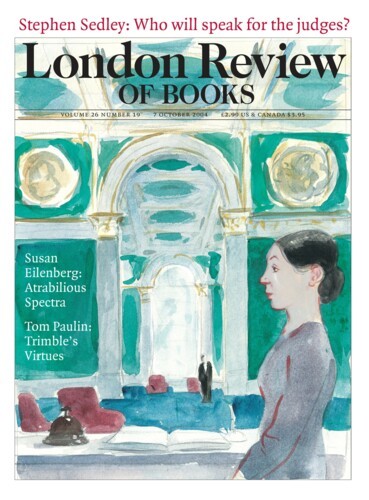We live in an age, or if not an age a country, where seemingly novel disorders of the mind or body are given names that leave you in no doubt as to their novelty. Who would have thought, for example, that the 18th-century shooter of lines, Baron Munchausen, would one day have his place on the list of state-of-the-art ailments as the patron of something called Munchausen’s syndrome by proxy? This is not the snappiest form of words that diagnosticians have at hand to scare a patient with; indeed, it trips so uneasily from the tongue that you wonder how often it actually gets said when the professionals confer on what they take to be cases of it. (Short Cuts being by definition compelled to brevity, the condition will here be reduced to MSbP.) MSbP is not an entirely new syndrome, but a recent extension of an earlier one, the bP having been tacked on by way of a postscript to what, under the headword ‘Munchausen’, the dictionary defines as ‘a syndrome in which a person feigns injury or illness in order to obtain hospital treatment’. That’s not something that the Baron himself was ever remotely guilty of so far as I know; a liar he may have been but a heroically implausible one, not even asking to be believed let alone hustled off into hospital. The proxy bit that is now used, if not to fine-tune the diagnosis then at least to confuse it, is potentially rather sinister, implying as it does that whoever’s held to be suffering from MSbP feigns illness or injury on behalf of someone other than themselves: except that whenever MSbP enters the public domain, as it now quite often does, it seems to involve not the feigning of illness or injury in the someone other, but the infliction of an injury or even death on them.
So although it’s a silly name for the medical world to have come up with, it can be deployed in contexts that are all too serious, as we know from three recent court cases in which mothers were accused of killing their babies. Two of the three were found guilty of infanticide and jailed; the third was found not guilty. In the reporting of these trials, MSbP had its part to play, cited, without anyone appearing to ask how reputable or even meaningful a term it was, as a standard item of the medical vocabulary, and as such fit to be put before a lay judge and jury. The two women who were jailed have now been released, and their convictions have been declared unsafe, while two senior paediatricians involved, who have regularly been called on to give expert evidence in cases where infants have died inexplicably in their cots, are themselves in trouble, the reliability of their expertise having been greatly compromised. Their branch at least of the profession has come spectacularly badly out of the sad cases in question.
It’s a great pity that doctors should be so given to airing coinages like MSbP without being got to explain once in a while what they believe the true relationship to be between the name of a medical condition and the nature of the condition it refers to. There is, it so happens, a splendidly hard-headed and enlightening essay on this crucial question, written in the 1920s by a doctor, F.G. Crookshank, who faults those who practise medicine for refusing ever to look hard at its ‘First Principles’ and, chief among these, ‘the use they make of symbols’. Crookshank’s essay appeared as an appendix to C.K. Ogden and I.A. Richards’s once celebrated, by now I guess half-forgotten, The Meaning of Meaning, a book concerned with the Theory of Symbols whose notably astringent authors had taken, early on, what later became known as the ‘linguistic turn’ in philosophy.
In their wake, Dr Crookshank argues that what doctors fail just about all of them to take into account is ‘the relations between Things, Thoughts and Words involved in their communications to others’, a failure that leads them to ‘set up idols in the market-place’, which is no bad description of MSbP. No one would deny that this clumsy formulation is a term of reference, but what it refers to, as Crookshank repeatedly stresses, is not an ‘entity’, a state of bodily or mental affairs that’s invariably the same whenever and wherever it is found. Diseases aren’t entities and the names they go under are no more than handy generalisations: ‘It is a vulgar medical error to speak, write and ultimately to think, as if these diseases we name, these general references we symbolise, were single things with external existences.’ Go along with what Crookshank wrote all those years ago, by way of warning his confrères to be less gung-ho and inflexible when pinning names on the particular conditions they meet with, and you start to realise that what you should be wanting to know from your GP next time around is not which entity, in a word, you’ve got, but what, in rather more words, may be the matter with you.
Send Letters To:
The Editor
London Review of Books,
28 Little Russell Street
London, WC1A 2HN
letters@lrb.co.uk
Please include name, address, and a telephone number.

